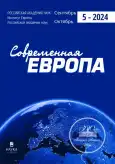Emergence of Germany as an International Space Standort
- Autores: Belov V.B1
-
Afiliações:
- Institute of Europe, Russian Academy of Sciences
- Edição: Nº 5 (126) (2024)
- Páginas: 21-35
- Seção: EUROPEAN PROCESS: COUNTRIES AND REGIONS
- URL: https://rjsvd.com/0201-7083/article/view/652312
- DOI: https://doi.org/10.31857/S0201708324050024
- ID: 652312
Citar
Texto integral
Resumo
This article analyses the current state and future prospects of Germany's civil space sector. In late September 2023, a new space strategy was presented, replacing the previous one adopted in November 2010. The update was aligned with the coalition agreement of the new government at the end of 2021. The goals and objectives were further refined in the Future Strategy for Research and Innovation at the beginning of 2023. The author explores the historical background of the formation of Germany's aerospace complex, the main outcomes of the National Space Program, and the first space strategy from 2010 to 2023. Special attention is given to the reasons for and the necessity of refining strategic priorities. The article assesses the prospects for Germany's further development as a competitive space hub. The government is focused on finding a sustainable international niche. The challenge lies in the sharp increase in competition, particularly in the commercial sector (New Space). Competition is intensifying both from partners within the collective West and from countries in the Global South, primarily China and India. The article provides an analysis of public-private partnerships, the role of entrepreneurial interest groups, their dialogue with the government, the development of national space legislation, the advancement of existing infrastructure, and innovative startups. The author questions the ruling coalition's ability to successfully launch the new space strategy and fill it with specific content. It is concluded that this task will likely be taken up by the next government, led by the CDU/CSU.
Palavras-chave
Sobre autores
V. Belov
Institute of Europe, Russian Academy of Sciences
Email: belov@instituteofeurope.ru
Candidate of Sciences (Economics) Member of Director Board, Chief of Department for countries researches and of Center for German studies Moscow, Russia
Bibliografia
- Белов В.Б. (2022) Новое правительство ФРГ и германо-российские отношения. Фактор Украины. Часть 3. Научно-аналитический вестник ИЕ РАН. № 3. С. 70–82. doi: 10.15211/vestnikieran320227082
- Belov V.B. (2022) Novoe pravitel'stvo FRG i germano-rossiiskie otnosheniia. Faktor Ukrainy. Chast' 3 [The new government of Germany and German-Russian relations. Ukraine factor. Part 3], Nauchno-analiticheskii vestnik IE RAN, 3, pp. 70–82. doi: 10.15211/vestnikieran320227082 (In Russian).
- Жданов В.Л. (2010) Основоположники американской и германской космической политики. Вестник Военного университета. № 1(21). С. 81–87.
- Камолов С. Г., Миракова Д. А. (2019) Коммерциализация космической деятельности: ключевые тренды современности.
- Zhdanov V.L. (2010) Osnovopolozhniki amerikanskoi i germanskoi kosmicheskoi politiki [Founders of American and German space policy], Vestnik Voennogo universiteta, 1(21), pp. 81–87. (In Russian).
- Интеллект. Инновации. Инвестиции. № 7. С. 52–63. doi: 10.25198/2077-7175-2019-7-52.
- Kamolov S.G., Mirakova D.A. (2019) Kommerzializatsiia kosmicheskoi deiatel'nosti: kliuchevye trendy sovremennosti [Commercialization of space activities: key trends of modernity], Intellekt. Innovatsii. Investitsii, 7, pp. 52–63. doi: 10.25198/2077-7175-2019-7-52 (In Russian).
- Клинова М.В. (2024) Космическая «нить Ариадны» для Франции и Европы в середине ХХ–XXI веков. Новая и новейшая история. № 4. С. 159– 172. doi: 10.31857/S0130386424040127
- Klinova M.V. (2024) Kosmicheskaia “nit' Ariadny” dlia Frantsii i Evropy v seredine XX–XXI vekov [The “Ariadne's space thread” for France and Europe in the mid-20th to 21st centuries], Novaia i noveishaia istoriia, 4, pp. 159–172. doi: 10.31857/S0130386424040127 (In Russian).
- Попцов Д. (2019) Европейский космос и немецкий прагматизм. Экспертные колонки РСМД. 13.11. URL: https://russiancouncil.ru/analytics-and-comments/columns/space/evropeyskiy-kosmos-i-nemetskiy-pragmatizm/ (дата обращения: 01.08.2024).
- Poptsov D. (2019) Evropeiskii kosmos i nemetskii pragmatizm [European space and German pragmatism], Ekspertnye kolonnki RSMD, 13.11. URL: https://russiancouncil.ru/analytics-and-comments/columns/space/evropeyskiy-kosmos-i-nemetskiy-pragmatizm/ (accessed: 01.08.2024). (In Russian).
- Шугуров М.В. (2023) Международное научно-техническое сотрудничество с участием России в космической сфере в условиях санкций: итоги и перспективы. Политика и Общество. № 4. С. 14–35. doi: 10.7256/2454-0684.2023.4.69123
- Shugurov M.V. (2023) Mezhdunarodnoe nauchno-tekhnicheskoe sotrudnichestvo s uchastiem Rossii v kosmicheskoi sfere v usloviiakh sanktsii: itogi i perspektivy [International scientific and technical cooperation involving Russia in the space sphere under sanctions: results and prospects], Politika i Obshchestvo, 4, pp. 14–35. doi: 10.7256/2454-0684.2023.4.69123 (In Russian).
- Энтина Е.Г. (2023) Методы повышения конкурентоспособности космической деятельности ЕС. Современная Европа. № 7. С. 49–63. DOI: 110.31857/S0201708323070045
- Entina E.G. (2023) Metody povysheniia konkurentosposobnosti kosmicheskoi deiatel'nosti ES [Methods for improving the competitiveness of EU space activities], Sovremennaia Evropa, 7, pp. 49–63. DOI: 110.31857/S0201708323070045 (In Russian).
- Institut für Innovation und Technik, Kerlen Evaluation, KMU Forschung Austria (2021) Evaluation des Nationalen Programms für Weltraum und Innovation. iit, Berlin, Germany. 189 p.
- Kind S., Jetzke T., Nögel L, Bovenschulte M., Ferdinand, J.-P. (2020) New Space – neue Dynamik in der Raumfahrt. Büro für Technikfolgen-Abschätzung beim Deutschen Bundestag, Berlin, Germany. 132 p. doi: 10.5445/IR/1000130986
- Roland Berger, BDI (2023) Weltraumbeflügeltes Deutschland. 35 p. URL: https://www.rolandberger.com/de/Insights/Publications/Weltraumbefl%C3%BCgeltes-Deutschland.html (accessed: 01.08.2024).
Arquivos suplementares










